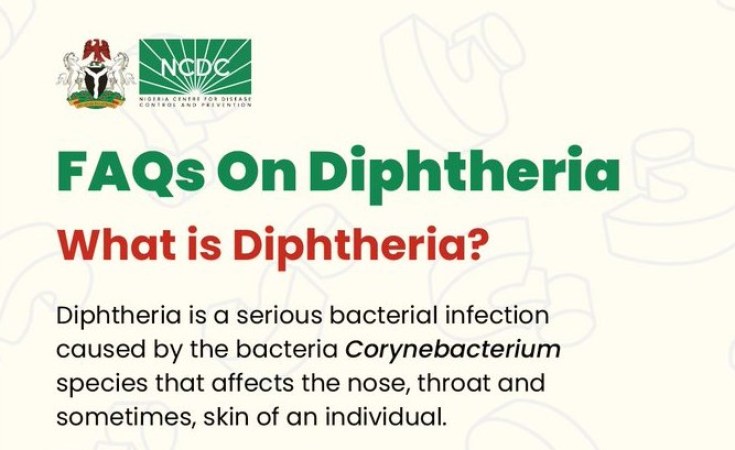From May 2022 to July, an estimated 2,455 suspected cases of diphtheria have been reported in 26 states in Nigeria.
The World Health Organisation (WHO) on Monday said plans are underway to deliver 1,800 vials of Diphtheria Antitoxin (DAT) to Nigeria early August.
The WHO country representative, Walter Mulombo, made this known at a joint press conference on diphtheria outbreak response organised by the National Primary Health Care Development Agency (NPHCDA).
Mr Mulombo said WHO was requested by the Nigeria Centre for Disease Control (NCDC), to procure DAT and Erythromycin IV for diphtheria case management.
"Erythromycin IV refers to intravenous administration of the antibiotic medication erythromycin. Erythromycin is a macrolide antibiotic that is used to treat various bacterial infections," he said.
"It works by inhibiting the growth of bacteria, thereby helping the body's immune system to fight off the infection."
He said that the 1800 vials of DAT are expected to arrive Nigeria on 2 August, and erythromycin in one to two weeks time, pending government authorisation.
"These health commodities are essential for saving lives and reducing the sequelae in the affected patients, thus the need to be prepositioned in Nigeria and ready to be deployed to the states in need," he said.
WHO support
Mr Mulombo disclosed that recently the NCDC requested support from WHO for the deployment of 18 rapid response teams to support response in Bauchi, Kaduna and Katsina states.
He said the deployment process is underway following the requested profile and a mix of the workforce from the Nigeria Field Epidemiology and Laboratory Training Programme (NFELTP), and WHO staff will be used.
He noted that the WHO team is on the ground in Yobe and Kano states to improve the surveillance at the health facility and community level, supporting the active case search and supporting the decentralised isolation centres and referral to the state reference treatment centres.
He said WHO is also supporting the procurement of laboratory commodities to increase the result turnaround time to support the case definition and management at an early stage.
Zero dose children
The UNICEF Chief of Health in Nigeria, Eduardo Celades, said the country is home to the second-largest number of zero-dose children in the world.
Mr Celades said, so far the country has been able to reach about 150,000 children while stressing that more needed to be done.
He noted that the COVID-19 pandemic has fuelled a recurrence of diphtheria in the country.
"Zero-dose children remain vulnerable to vaccine-preventable diseases, along with under-immunised or "missed dose" children, which refers to those who do not complete their immunisation as stated in the National Immunisation schedule," he said.
He urged k her the government, traditional, religious, and community leaders, to create partnerships to ensure that every child in the country is immunised.
"I also implore mothers and caregivers to ensure that children receive all relevant childhood vaccines as contained in the country's routine immunisation schedule."
About Diphtheria
Diphtheria is a serious bacterial infection caused by the Corynebacterium species that affects the nose, throat, and sometimes, the skin of an individual.
The NCDC noted that people most at risk of contracting diphtheria are children and adults who have not received any or a single dose of the pentavalent vaccine, people who live in a crowded environment, in areas with poor sanitation and healthcare workers who are exposed to suspected or confirmed cases of diphtheria.
The agency noted that the disease spreads easily between people through direct contact with infected people, droplets from coughing or sneezing, and contact with contaminated clothing and objects.
The symptoms of diphtheria include fever, runny nose, sore throat, cough, red eyes (conjunctivitis) and neck swelling. In severe cases, NCDC said, a thick grey or white patch appears on the tonsils and/or at the back of the throat, causing difficulty in breathing.
From May 2022 to July 2023, an estimated 2,455 suspected cases have been reported in 26 states in Nigeria.
As of July 27, 2023, 836 of these cases have been confirmed in 33 LGAs across eight states: Cross River, Kano, Katsina, Kaduna, Lagos, Osun, Yobe, and FCT.
Tragically, 83 deaths have been reported from these confirmed cases, making vaccination against this deadly disease critically important, especially for children.
About DAT
Diphtheria Antitoxin is a medication used to treat diphtheria, a bacterial infection that can cause severe respiratory distress and other complications.
The antitoxin is administered to patients who have been diagnosed with diphtheria to neutralise the toxins produced by the bacteria and prevent further damage to the body.
The number of vials required for treatment can vary depending on the severity of the infection and the patient's condition.


